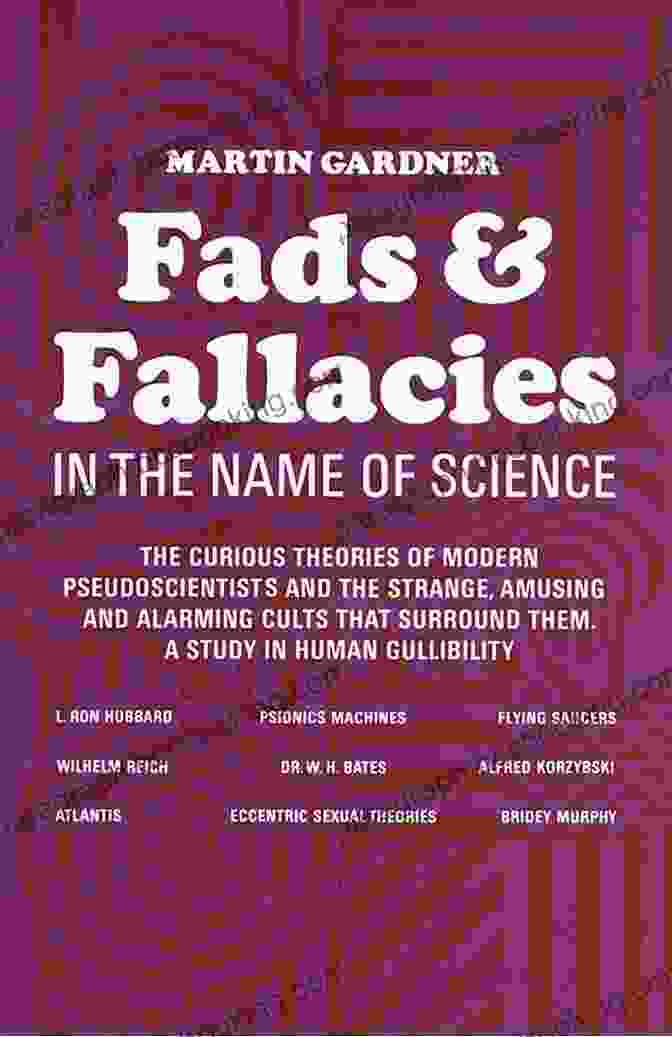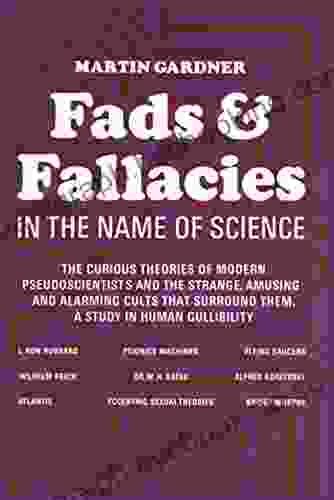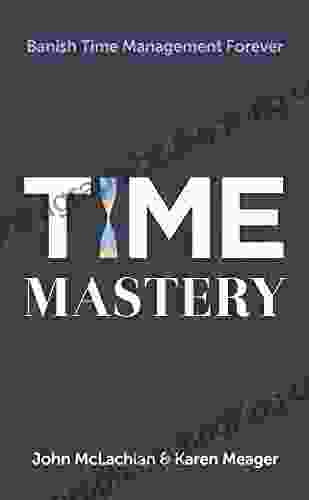Fads and Fallacies in the Name of Science: Uncovering the Truth Behind Popular Science

In the realm of science, where objectivity and evidence reign supreme, it is disheartening to witness the infiltration of fads and fallacies that distort the true nature of scientific inquiry. These sensationalized claims and unverified theories often captivate the public's attention, obscuring the genuine advancements and discoveries that drive scientific progress.

4.5 out of 5
| Language | : | English |
| File size | : | 1427 KB |
| Text-to-Speech | : | Enabled |
| Screen Reader | : | Supported |
| Enhanced typesetting | : | Enabled |
| Word Wise | : | Enabled |
| Print length | : | 384 pages |
| Lending | : | Enabled |
The Erosion of Scientific Integrity
Fads and fallacies in science erode the public's trust in the scientific process and the institutions that support it. When the media and popular culture promote unfounded claims, it creates a false sense of scientific consensus, leading individuals to believe that these ideas have been rigorously tested and validated. This undermines the authority of legitimate scientific research and makes it difficult for the public to discern between fact and fiction.
Common Fads and Fallacies
Numerous fads and fallacies have proliferated in the name of science, each exploiting a specific human bias or weakness. Here are a few prevalent examples:
1. Pseudoscience: The Masquerade of Science
Pseudoscience pretends to be scientific but lacks the rigorous methods and empirical evidence that characterize genuine scientific inquiry. It often relies on anecdotal evidence, appeals to authority, and confirmation bias to support its claims. Examples include astrology, homeopathy, and creationism.
2. Confirmation Bias: Seeking Evidence to Support Beliefs
Confirmation bias is the tendency to seek out information that confirms our existing beliefs and disregard evidence that contradicts them. This can lead to selective perception, distortion of data, and the formation of echo chambers where only like-minded individuals reinforce each other's views.
3. Appeal to Emotion: Playing on People's Hopes and Fears
Fallacious arguments often appeal to emotion rather than logic by playing on people's hopes, fears, or prejudices. This can be particularly effective in promoting health-related claims or conspiracy theories that prey on individuals' vulnerabilities.
4. Overgeneralization: Making Broad Claims from Insufficient Evidence
Overgeneralization occurs when s are drawn from a small or unrepresentative sample, resulting in sweeping statements that are not supported by adequate evidence. This can lead to inaccuracies, exaggeration, and the creation of unfounded stereotypes.
5. Correlation ≠ Causation: Mistaking Association for Cause-and-Effect
Correlation does not imply causation. Just because two events occur together does not mean one causes the other. This fallacy can lead to spurious relationships being drawn between events, resulting in misleading s.
The Dangers of Uncritical Acceptance
Uncritical acceptance of fads and fallacies in the name of science can have far-reaching consequences. It can:
* Impede scientific progress by diverting resources and attention away from genuine research. * Undermine public health and safety by promoting ineffective or even harmful practices. * Foster distrust in science and scientific institutions, eroding the foundation of evidence-based decision-making. * Spread misinformation and sow confusion, hindering public understanding of scientific issues.
The Importance of Critical Thinking
Countering the spread of fads and fallacies in science requires the development of critical thinking skills. Critical thinkers evaluate information objectively, question assumptions, seek out reliable sources, and avoid being swayed by emotional appeals. They recognize the limitations of scientific knowledge and understand the importance of ongoing research and refinement.
Book Summary: "Fads and Fallacies in the Name of Science"
This comprehensive book explores the prevalence, dangers, and strategies for combating fads and fallacies in the name of science. It provides a detailed examination of common fallacies, case studies of historical and contemporary examples, and practical guidance on how to evaluate scientific claims critically. By equipping readers with the knowledge and tools to discern fact from fiction, this book aims to restore trust in science and promote informed decision-making in an era of scientific misinformation.
Fads and fallacies in science represent a significant threat to the integrity and advancement of scientific knowledge. Their uncritical acceptance can lead to misguided beliefs, harmful practices, and a diminished public understanding of science. By fostering critical thinking, promoting scientific literacy, and holding scientists and scientific institutions accountable for maintaining the highest standards of rigor and transparency, we can safeguard the integrity of science and ensure that its true potential continues to illuminate our world.
4.5 out of 5
| Language | : | English |
| File size | : | 1427 KB |
| Text-to-Speech | : | Enabled |
| Screen Reader | : | Supported |
| Enhanced typesetting | : | Enabled |
| Word Wise | : | Enabled |
| Print length | : | 384 pages |
| Lending | : | Enabled |
Do you want to contribute by writing guest posts on this blog?
Please contact us and send us a resume of previous articles that you have written.
 Book
Book Novel
Novel Page
Page Chapter
Chapter Text
Text Story
Story Genre
Genre Reader
Reader Library
Library Paperback
Paperback E-book
E-book Magazine
Magazine Newspaper
Newspaper Paragraph
Paragraph Sentence
Sentence Bookmark
Bookmark Shelf
Shelf Glossary
Glossary Bibliography
Bibliography Foreword
Foreword Preface
Preface Synopsis
Synopsis Annotation
Annotation Footnote
Footnote Manuscript
Manuscript Scroll
Scroll Codex
Codex Tome
Tome Bestseller
Bestseller Classics
Classics Library card
Library card Narrative
Narrative Biography
Biography Autobiography
Autobiography Memoir
Memoir Reference
Reference Encyclopedia
Encyclopedia Ray Eye
Ray Eye Paolo Cognetti
Paolo Cognetti Larry Berman
Larry Berman Shahid Nawaz
Shahid Nawaz Jonathan Pope
Jonathan Pope Natasha Boyd
Natasha Boyd Josephine Mccarthy
Josephine Mccarthy Po Bronson
Po Bronson Jonathan Harr
Jonathan Harr John Pinder
John Pinder Johnathon Allen
Johnathon Allen P Anshu
P Anshu Lisa M Schab
Lisa M Schab Joi Barrios
Joi Barrios John Steinbreder
John Steinbreder Joseph Delaney
Joseph Delaney Josh Swiller
Josh Swiller John Man
John Man Kelly N Jane
Kelly N Jane Joseph Heath
Joseph Heath
Light bulbAdvertise smarter! Our strategic ad space ensures maximum exposure. Reserve your spot today!

 Jack LondonUnveiling the Enigmatic World of The Indigo Girl Novel: A Literary Odyssey of...
Jack LondonUnveiling the Enigmatic World of The Indigo Girl Novel: A Literary Odyssey of... Winston HayesFollow ·12.2k
Winston HayesFollow ·12.2k Mark TwainFollow ·12.2k
Mark TwainFollow ·12.2k Eli BrooksFollow ·7.3k
Eli BrooksFollow ·7.3k Robert ReedFollow ·16.1k
Robert ReedFollow ·16.1k Thomas PynchonFollow ·14.5k
Thomas PynchonFollow ·14.5k Juan RulfoFollow ·14.7k
Juan RulfoFollow ·14.7k Wade CoxFollow ·9k
Wade CoxFollow ·9k Corey GreenFollow ·7k
Corey GreenFollow ·7k

 Joseph Foster
Joseph FosterUnravel the Enigmatic Murders in "Pride and...
Dive into a World...

 Jeffery Bell
Jeffery BellTrauma-Focused CBT for Children and Adolescents: The...
Trauma is a...

 Jorge Luis Borges
Jorge Luis BorgesSense and Second Degree Murder: A Jane Austen Murder...
Prepare yourself for a...

 Chase Simmons
Chase SimmonsUnleash the Vibrant World of Watercolor: An Enchanting...
In the world of art, watercolor painting...

 Rubén Darío
Rubén DaríoAmerican Funny Animal Comics In The 20th Century: A...
Step into a bygone era of laughter and...
4.5 out of 5
| Language | : | English |
| File size | : | 1427 KB |
| Text-to-Speech | : | Enabled |
| Screen Reader | : | Supported |
| Enhanced typesetting | : | Enabled |
| Word Wise | : | Enabled |
| Print length | : | 384 pages |
| Lending | : | Enabled |












